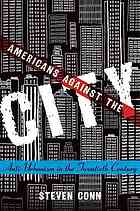

Most ebook files are in PDF format, so you can easily read them using various software such as Foxit Reader or directly on the Google Chrome browser.
Some ebook files are released by publishers in other formats such as .awz, .mobi, .epub, .fb2, etc. You may need to install specific software to read these formats on mobile/PC, such as Calibre.
Please read the tutorial at this link: https://ebookbell.com/faq
We offer FREE conversion to the popular formats you request; however, this may take some time. Therefore, right after payment, please email us, and we will try to provide the service as quickly as possible.
For some exceptional file formats or broken links (if any), please refrain from opening any disputes. Instead, email us first, and we will try to assist within a maximum of 6 hours.
EbookBell Team

4.8
74 reviews"It is a paradox of American life that we are a highly urbanized nation filled with people deeply ambivalent about urban life. In this provocative and sweeping book, historian Steven Conn explores the "anti-urban impulse" across the 20th century and examines how those ideas have shaped the places Americans have lived and worked, and how they have shaped the anti-government politics so strong today. As Conn describes it, the anti-urban impulse has had two parts: first, an aversion to urban density and all that it contributes to urban life, especially social diversity, and second, a perception that the city was the place where "big government" first took root in America. In response, in varying ways across the 20th century, anti-urbanists called for the decentralization of the city, both its population and its economy, and they rejected the role of government in American life in favor of a return to the pioneer virtues of independence and self-sufficiency. In this way, by the middle of the 20th century anti-urbanism was at the center of the politics of the New Right. Conn starts in the booming industrial cities of the Progressive era at the turn of the 20th century, where these questions first began to be debated, and ends with some of the New Urbanist experiments of the turn of the 21st. Along the way he examines the decentralist movement of the 1930s, the attempt to revive the American small town in the mid-century, the anti-urban basis of urban renewal in the 1950s and '60s, and the Nixon Administration's program of building new towns as a response to the urban crisis. Engagingly written, thoroughly researched and forcefully argued, Americans Against the City is important reading for anyone who cares not just about the history of our cities, but also about their future"--